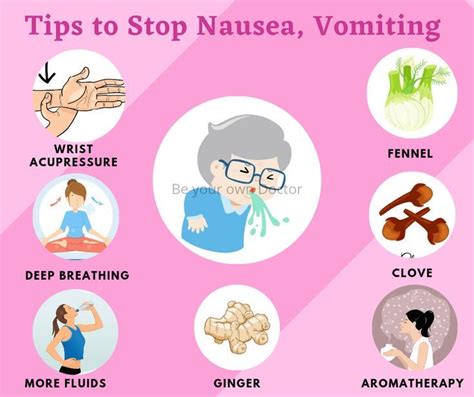Intro
Stop nausea naturally with 5 effective methods, including home remedies, dietary changes, and stress management techniques to alleviate vomiting, dizziness, and queasiness, promoting digestive health and overall wellness.
Nausea is an uncomfortable and debilitating symptom that can affect anyone, regardless of age or health status. It can be triggered by a variety of factors, including motion sickness, food poisoning, pregnancy, and certain medical conditions. When nausea strikes, it can be challenging to find relief, but there are several strategies that can help alleviate this unpleasant symptom. In this article, we will explore five ways to stop nausea, providing you with practical tips and advice to manage this condition effectively.
The importance of addressing nausea cannot be overstated. Not only can it cause significant discomfort, but it can also lead to dehydration, electrolyte imbalances, and other complications if left untreated. Furthermore, nausea can have a profound impact on daily life, making it difficult to work, socialize, and engage in activities that bring joy and fulfillment. By understanding the causes of nausea and learning how to manage it, individuals can take control of their health and well-being, reducing the risk of complications and improving their overall quality of life.
Nausea is a complex symptom that can be influenced by a variety of factors, including hormonal changes, digestive issues, and neurological responses. In some cases, nausea can be a symptom of an underlying medical condition, such as gastroesophageal reflux disease (GERD), irritable bowel syndrome (IBS), or migraines. In other cases, it can be triggered by external factors, such as motion, certain foods, or stress. By identifying the underlying causes of nausea, individuals can develop targeted strategies to manage this symptom, reducing its frequency and severity.
Understanding Nausea

Causes of Nausea
Nausea can be caused by a variety of factors, including: * Motion sickness * Food poisoning * Pregnancy * Certain medical conditions, such as GERD, IBS, or migraines * Medications, such as antibiotics or pain relievers * Hormonal changes * Digestive issues, such as constipation or diarrhea * Neurological responses, such as stress or anxiety5 Ways to Stop Nausea

Additional Tips
In addition to these strategies, there are several other tips that can help alleviate nausea, including: * Avoiding triggers, such as certain foods or motion * Practicing relaxation techniques, such as deep breathing or meditation * Getting fresh air, such as taking a short walk outside * Avoiding heavy meals or greasy foods * Keeping a food diary to track symptoms and identify potential triggersManaging Chronic Nausea

When to Seek Medical Attention
While nausea can often be managed with self-care strategies and over-the-counter medications, there are certain situations where medical attention is necessary. If you experience any of the following symptoms, seek medical attention immediately: * Severe vomiting or diarrhea * Abdominal pain or tenderness * Fever or chills * Dehydration or electrolyte imbalances * Difficulty breathing or swallowing * Severe headache or confusionConclusion and Next Steps

We encourage you to share your experiences and tips for managing nausea in the comments below. Have you found any effective strategies for alleviating nausea? What triggers your nausea, and how do you manage it? By sharing your stories and advice, you can help others who are struggling with this uncomfortable symptom.
What are the most common causes of nausea?
+Nausea can be caused by a variety of factors, including motion sickness, food poisoning, pregnancy, certain medical conditions, medications, hormonal changes, digestive issues, and neurological responses.
How can I alleviate nausea naturally?
+There are several natural strategies that can help alleviate nausea, including staying hydrated, consuming ginger, practicing relaxation techniques, and eating a bland diet.
When should I seek medical attention for nausea?
+Seek medical attention immediately if you experience severe vomiting or diarrhea, abdominal pain or tenderness, fever or chills, dehydration or electrolyte imbalances, difficulty breathing or swallowing, or severe headache or confusion.
Can nausea be a symptom of an underlying medical condition?
+Yes, nausea can be a symptom of an underlying medical condition, such as gastroesophageal reflux disease (GERD), irritable bowel syndrome (IBS), or migraines. If you are experiencing persistent or severe nausea, consult with a healthcare professional to rule out any underlying conditions.
How can I prevent nausea in the future?
+To prevent nausea in the future, identify and avoid triggers, practice relaxation techniques, stay hydrated, and eat a balanced diet. Additionally, consider taking over-the-counter medications or consulting with a healthcare professional for personalized advice.
